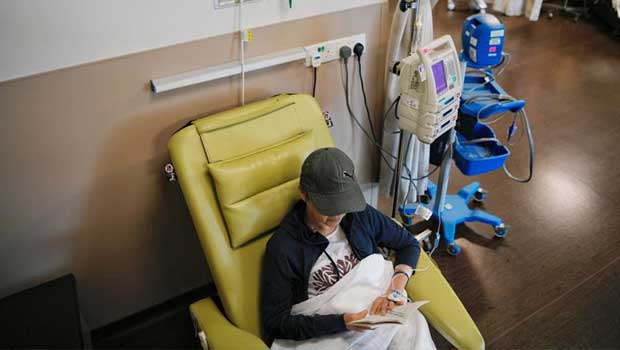
Immunotherapy offers alternative for some patients where conventional therapies fail
In the world of cancer treatment, immunotherapy has been a game-changer for some patients.
The treatment, which has been gaining traction in recent years, harnesses drugs to supercharge the immune system so it is better able to seek out and kill cancer cells.
While immunotherapy has turned the tide for certain patients in which conventional radiotherapy or chemotherapy has failed, it does not work on everyone. Not all immunotherapy is covered by insurance, and it can also be expensive, with treatments costing around $5,000 per dose. Usually, patients have four to six doses over a three-month period, and if the treatment works, they continue with it, often for up to two years.

Dr Raghav Sundar (above), a consultant at the cancer institute, says immunotherapy is not the magic bullet but an additional weapon in the fight against cancer. If doctors know from the outset that immunotherapy will not work for a patient, they can switch to other options.ST PHOTO: MARK CHEONG
"Immunotherapy is not the magic bullet, it's an additional weapon in the fight against cancer," said clinician-scientist Raghav Sundar.
"While it's definitely the next wave in cancer treatment, it's also definitely not the last wave."
In the case of gastric or stomach cancer, it is being tested on patients with Stage 4 cancer, where the illness has spread to other parts of the body, and conventional treatment does not work.
Here, tumour shrinkage with this therapy occurs in 12 per cent of patients, and the two-year survival rate is 12 per cent. For the rest, it has little effect.
So it is critical to distinguish between the two groups.
Dr Sundar, part of a team that includes the National University Cancer Institute, Singapore, and Duke-NUS Medical School, has done just that.
Using a new algorithm to analyse the tumours, the researchers - who come under the Singapore Gastric Cancer Consortium - found a way to identify which gastric cancer sufferers would not benefit, an effort that will save the patients time and money, and spare them possible side effects of such treatment.
They discovered a negative predictive biomarker - a biological molecule found in the tumour tissue which signals that immunotherapy will fail. The biomarker is one of the first that has been uncovered at the epigenetic level, where chemical reactions occur between the gene and its translation into proteins.
"While immunotherapy has fewer side effects than chemotherapy, they can still be serious, and possibly even fatal," noted Dr Sundar, a consultant at the cancer institute's department of haematology-oncology, and first author in the latest research, which was published in the journal Annals Of Oncology.
If doctors know from the outset that immunotherapy will not work, they can switch to alternative options such as different chemotherapy drugs or clinical trials, he added.
Stomach cancers cause approximately 800,000 deaths worldwide each year. In Singapore, they are the fourth leading cause of cancer death in men and the fifth leading cause of cancer death in women.
Conducted in collaboration with South Korea, the initial work, while promising, will require further validation in larger populations before it becomes available in hospitals and clinics.
 The team is now planning a large-scale trial involving local and international stomach cancer patients, to confirm the results of the earlier work, which involved 61 patients.
The team is now planning a large-scale trial involving local and international stomach cancer patients, to confirm the results of the earlier work, which involved 61 patients.
If approved for clinical use, the test would involve analysis of tumour tissue that is usually available as part of routine clinical use. The team is hopeful it will be available for patients within the next two to three years.
Dr Iain Tan, senior consultant medical oncologist and clinician-scientist at the National Cancer Centre Singapore, told The Straits Times that the latest work was an important contribution to the field. "Accurately predicting who responds allows us to efficiently focus current immunotherapy use in responders. In non-responders, it provides possible biological reasons for lack of response and motivates rational development of new treatment strategies," he said.
Pointing out that the team had identified particular stretches of DNA that were an important determinant of immunotherapy response, he added: "Once verified in additional patient cohorts and other cancers, doctors can begin to use this to stratify treatment choices for our patients in gastric cancer and beyond."
The technology used could also be customised for widespread use in routinely available tumour biopsy material, so many patients would potentially be able to access this test and benefit from the group's finding, he said.
Dr Elizabeth Smyth, consultant in medical oncology at the Cambridge University Hospitals NHS Foundation Trust, said that being able to predict in advance which patients would benefit from immunotherapy was essential. It would not only spare those who would see no benefit from potential side effects, but help lower healthcare costs as well.
The research by Dr Sundar's team was done on patients who had already been treated with immunotherapy, she noted, so the next step would be to develop the test in a clinical trial to help to choose patients to receive immunotherapy based on the test results.
"In this way, patients who are predicted to be resistant to immunotherapy will not be treated, and patients who are treated will be more likely to benefit," she said.
"This is an exciting prospect which would help personalise immunotherapy for stomach cancer patients."













 Get it on Google Play
Get it on Google Play